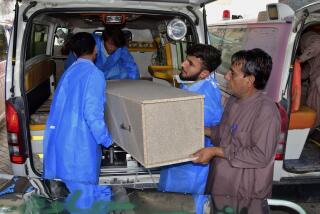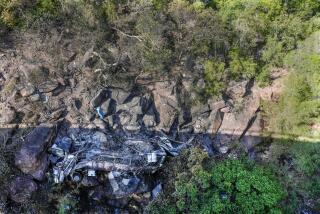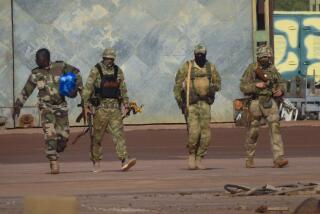Shabab militant group kills 28 in attack on Kenya bus
The Somali terror group Shabab on Saturday claimed responsibility for the massacre of 28 bus passengers, killed in an early morning attack near the Somali border in northern Kenya.
Around 60 people were ordered off a bus bound for Nairobi, then questioned by the terrorists, who separated Muslims from non-Muslims, according to officials.
“I can confirm that 28 innocent travelers were brutally executed by Al Shabab,” regional Police Chief Noah Mwavinda told local media. He said gunmen ordered passengers to recite a Koranic verse: Anyone who couldn’t was killed. The attack follows the pattern of previous terror attacks in Kenya in which Muslims have been spared.
The non-Muslims were ordered to lie down and were shot in the head. At least nine women were killed, Kenyan officials said on Twitter.
A chilling photograph depicted the horror: men and women lying face down on a grassy roadside, each shot in the head. Some of the victims’ heads were shattered by the gunshots. Pools of blood seeped into the ground.
The Shabab said in a statement Saturday that the attack was in revenge for actions by Kenyan “crusaders” against Muslims.
Four police officers, two border officials, the bus driver, health workers and schoolteachers were among the dead, local officials said.
The attack happened near the town of Mandera, in northern Kenya, a few miles from the northern border with Somalia, according to Kenya’s National Disaster Operation Center.
The NDOC and the Interior Ministry tweeted Saturday that the attackers’ base camps had been located by the Kenyan military and destroyed, with many militants killed. There were reports of helicopters and explosions in the village of Omar Jillao in the wake of Saturday’s attack.
The Shabab, an extremist Islamist militia linked to Al Qaeda, and its affiliates in Kenya have carried out dozens of deadly attacks in Kenya since 2011, when Kenyan troops were deployed in Somalia in response to a series of kidnappings of Western tourists and aid workers in northern and coastal Kenya.
The militants said the bus attack was in revenge for the suffering of Muslims in the coastal town of Mombasa. Police raided and closed down mosques and arrested hundreds of people in an operation they said was aimed at destroying extremist cells. At least one person was shot dead by police in the operation.
Police said they found explosive materials and extremist literature in the raids.
The Shabab is fighting the U.N.-backed Somali government, recently losing territory to Somali forces and AMISOM.
“The hearts of Muslims all over have been left in anguish in the light of events in recent days which affected our brethren in Mombasa, from the desecration of mosques, killings, arrests and other violations of rights and sanctities,” the statement from Shabab spokesman Sheik Ali Mahmud Rage said. He said the Shahab “resolved not to let these crimes go unpunished.”
“As for the Kenyan crusaders, you are fighting a losing battle against Islam, you have previously tasted the bitter reactions of your crusade campaign, and just as we have warned you before, we reiterate to you that you will have no safety until you cease your hostilities against Muslims.”
Shabab leader Ahmed Abdi Godane was killed in a U.S. airstrike in September, weakening the group, which has seen desertions since.
Last year, Shabab gunmen attacked a popular Nairobi shopping mall, killing at least 67 people. Earlier this year, extremists carried out a series of attacks on villages near Kenya’s cost, killing dozens of people. In both cases, survivors reported that gunmen questioned people about whether they were Muslims, freeing those who were, but shooting non-Muslims.
Kenyans have criticized Kenyan authorities for failing to protect the population against terrorist attacks and for ignoring warnings of impending attacks. But Kenya’s porous northern border with Somalia makes it difficult to prevent Shabab militants from infiltrating Kenya and carrying out attacks, particularly in the north.
The governor of Mandera County, Ali Ibrahim Roba, said authorities had downplayed the threat of terrorist attacks in Kenya’s border regions near Somalia.
“We always react after events,” he said on Twitter. “Kenyans must stand together. Terrorists must not incite Kenyans against each other.”
“This place has been prone to attacks. This is not the first time the government has totally ignored us, and you can now see how many innocent precious lives have been lost,” according to a local official Abdullahi Abdirahman, the Daily Nation newspaper reported.
The Kenyan Interior Ministry said on Twitter the attack was a crime carried out by “bandits.”
“Some leaders have been inciting Kenyans against religious lines. But I clarify that this is a criminal gang,” Secretary Joseph Ole Lenku said Saturday, according to the Interior Ministry.
Kenyan Police Chief David Kimaiyo said in a statement Saturday that buses in the area would be escorted by armed security forces.
More to Read
Start your day right
Sign up for Essential California for news, features and recommendations from the L.A. Times and beyond in your inbox six days a week.
You may occasionally receive promotional content from the Los Angeles Times.






